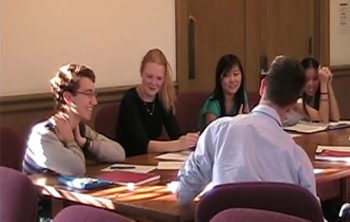An important aspect of PLTL is the fact that students are not provided the answers to group problems. Rather than focusing narrowly on the right answer, in PLTL “the emphasis is on learning to find, evaluate, and build confidence in answers… in a supportive environment” (Eberlein et al., 2008 p. 266).
The WUSTL Model
 Washington University’s model of PLTL is grounded in the above principles, but it has developed distinctive features related to our focus on process skills. Our model is designed to foster skills that support student success beyond the course or even the field. We guide students to become conscious of the problem-solving process, and to rigorously evaluate and revise those processes in light of the reasonableness of their results, rather than an answer key. WUSTL PLTL also helps students develop important collaboration skills, including how to approach problems effectively as a group, how to communicate well, and how to exchange and critique ideas in a collaborative environment. These process-skills transfer to nearly any work or life situation.
Washington University’s model of PLTL is grounded in the above principles, but it has developed distinctive features related to our focus on process skills. Our model is designed to foster skills that support student success beyond the course or even the field. We guide students to become conscious of the problem-solving process, and to rigorously evaluate and revise those processes in light of the reasonableness of their results, rather than an answer key. WUSTL PLTL also helps students develop important collaboration skills, including how to approach problems effectively as a group, how to communicate well, and how to exchange and critique ideas in a collaborative environment. These process-skills transfer to nearly any work or life situation.
Another distinctive feature of WUSTL’s model is that joining PLTL is strictly optional. The PLTL program is an opportunity that is offered in addition to the traditional recitation course. Consequently, participation in PLTL is treated as a responsibility, not an entitlement, and students have to live up to their obligations as group members to gain the benefits. Students who wish to become part of a PLTL group are required to sign a contract at the beginning of the semester that establishes the requirements for group membership. This contract begins the process of teaching students how to be productive and responsible group members.
We maximize the effectiveness of PLTL by investing heavily in the training and support of our Peer Leaders. We have designed two one-credit courses in which all peer-leaders must enroll. In these two courses, our Peer Leaders learn how to be strong mentors for their groups, and they form a collaborative group of their own to help one another address common PLTL challenges. Students who graduate from WUSTL’s Peer Leader program leave with strong leadership skills and self-confidence.
Comments from PLTL Participants
“Being able to explain the concepts helped me deepen my understanding.”
“PLTL forced me to understand the material. For me to explain the steps that I just took in solving a problem when working with a partner or in groups, I had to fully understand it. It was also a way for me to ask my peers clarifying questions, which was very beneficial.”
“It encouraged me to do chemistry on the weekends and to verbalize and articulate the concepts taught in lecture. It made me think about what was taught in a new and practical way.”
“It helped me to integrate the knowledge I learned in class in a dynamic way.”
References
Eberlein, T., Kampmeier, J., Minderhout, V., Moog, R. S., Platt, T., Varma-Nelson, P., et al. (2008). Pedagogies of engagement in science: A comparison of PBL, POGIL, and PLTL. Biochemistry and molecular biology education. 36(4), pp. 262-273.